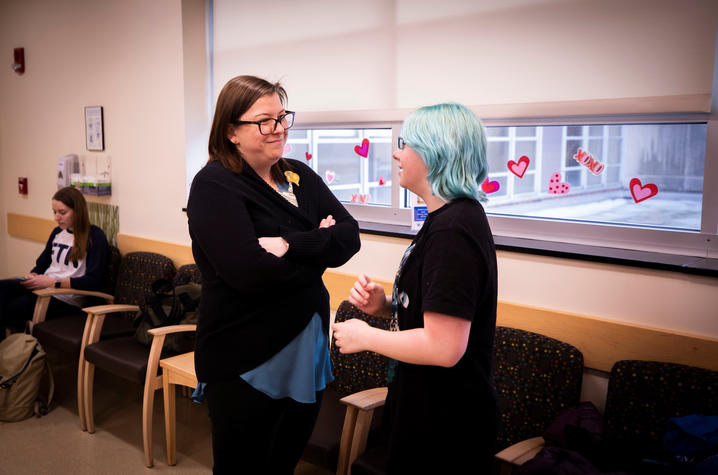Adolescents and Young Adult Program Offers New Approach to Treating Young Cancer Patients
LEXINGTON, Ky. (March 1, 2019) – The DanceBlue Kentucky Children's Hospital Hemotology/Oncology Clinic is taking a new approach to caring for patients ages 15-29 with Adolescent and Young Adult (AYA) program.
"It's a population that's underserved, and has unique needs," said Dr. John D'Orazio, interim chief of pediatric hematology and oncology.
Pediatric patients, infants to age 14, have resources not only for their treatment, but dedicated staff members to help with communicating with the patient's schools as well as a number of other resources to assist them as well as their families. Adult patients' needs include financial assistance, transport to and from appointments, and an advocate to work with insurance companies. The needs of adolescents and young adults fall somewhere in between.
Patients in high school and college struggle with the isolation that comes with a cancer diagnosis. Just as they move to become more independent, they lose their autonomy. School work and social lives suffer. For young adults just starting their first jobs, they get overwhelmed by billing and insurance companies.
“Patients diagnosed as adolescents and young adults have better outcomes if treated at a facility that specializes in pediatric and adult oncology," said Dr. Caryn Sorge, medical director for the AYA program. "By offering the opportunity to enroll in clinical trials we are pushing science forward to learn about not only the biology of this populations cancer but how to improve outcomes in these patients.”
The AYA program will have a dedicated social worker, school intervention specialist, as well as dietary and pain management support. In addition to in-clinic services, the staff will host quarterly dinners for patients and families to educate them on topics such as financial planning, insurance, healthy eating and how to work with colleges regarding course work and financial aid.
"As an example, say a patient has just started college and paid for the semester, but because of their illness, they can't attend their classes," said Dianna Holtzhauer, advanced registered nurse practitioner for the AYA program. "They need an advocate, someone who knows the university system. Our school intervention specialist is familiar with education systems and can work within the school as an advocate for the patient in many different areas of concern, such as with coursework, financial aid, or deferment if needed. The goal of the school intervention specialist is to provide a path allowing the patient may stay on track to achieve their academic goals. These are the types of things a young patient may not have the resources or the energy to address."
The same resources will be available to patients whether they receive their outpatient chemotherapy in the DanceBlue Clinic or Markey Cancer Center, where adult cancer patients are treated. Depending on their cancer diagnosis, they may be treated with pediatric therapy protocols. Those diagnoses include, but are not limited to, sarcomas, lymphoma and testicular and ovarian cancers. For cancers that tend to affect adults, such as colorectal, breast or thyroid cancers, patients would be treated with adult cancer protocols. Each case would be evaluated by the AYA onocology team to determine what course of treatment would best benefit the patient.






